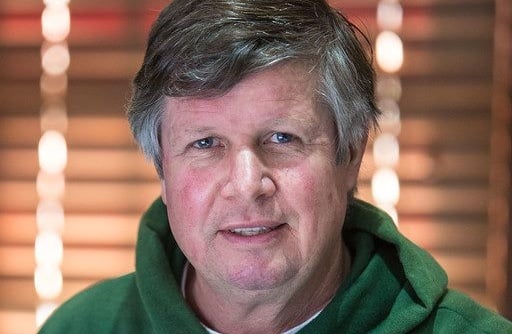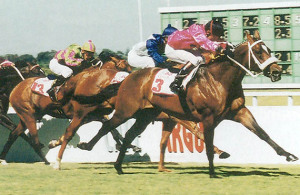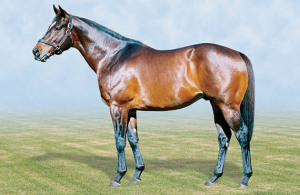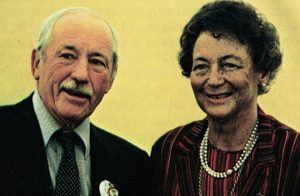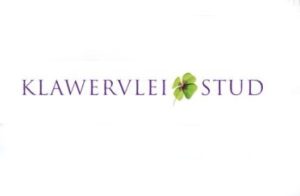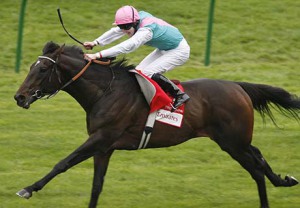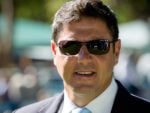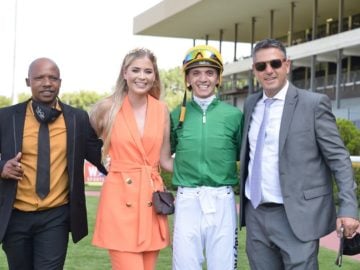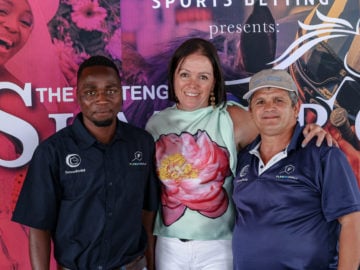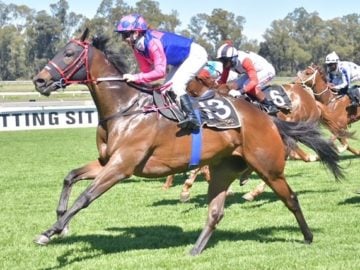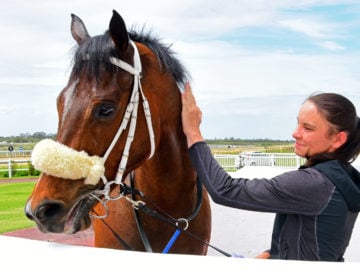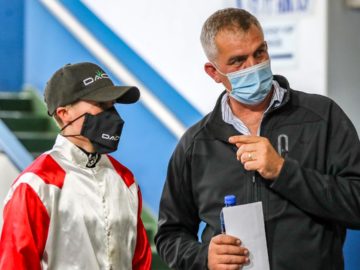John Koster is the third generation of the Koster family to breed Thoroughbreds in South Africa since his grandfather Ralph Koster founded his Klavervlei stud in Beaufort West back in 1943. Ralph had three sons: Peter, Werner and Wilfred and the third generation comprises Peter’s sons John (Klawervlei) and Charles (Klavervlei), Werner’s sons Graeme (Rosedene) and Ralph and Wilfred’s son Vaughan (Cheveley). There have been many great stallions, mares and racehorses that have helped pave the road to the breeding dynasty of today, but of them all, the one who has carried John and his Bonnievale operation, is the mighty Captain Al.
“I get shivers just telling you the story,” says John, sitting in the elegant, wood panelled Klawervlei box, adorned with photographs and trophies, most courtesy of his stud’s flagship stallion. “It is a tale of two families and a great horse.”
“It goes back to ‘varsity days. Lana-Anne was going to Gary dos Santos’ 21st and asked me to go with her. I didn’t want to go – it was her crowd of mates and I hadn’t even met Gary before, but I went. The party was at Gary’s house and when we got there, there was a shout from the balcony and his father, Manny dos Santos, summoned me up. He’d heard that I was a horse breeder and wanted to know whether I knew anything about a filly called Off To War. I said yes, she was by Complete Warrior (which was a stallion my dad bought and stood at Klavervlei). Manny explained that he’d bought the filly because the dam was called Infanta and he had a house there. We looked at her races and he asked if I’d take her to stud. It was the start of an amazing friendship.”
Handshakes and hugs
“Our deal was that Manny paid no keep, but after two foals, the mare was mine. For whatever reason, we never charged after the third foal either and one day Manny phoned and said ‘What’s going on?’ I said to him, ‘Uncle Manny, we swap and barter, we don’t charge.’ It was just like that. He had a workshop called Smith & Santos – I’d sent my bakkie in to Uncle Manny to be fixed and there was no charge. One day he came out to the farm to visit and it was incredibly hot and dry. He asked what we did when it was so hot and I said, not a lot! A short while later a lorry arrived with a swimming pool. That was a swap for another foal. When the fourth foal came round, Manny said to his son Gary, ‘John’s family is growing. Make sure you organise him a family vehicle.’ And then a combi arrived. And so it went. All our business was done on handshakes and hugs.”
Captain Al
“In those days Al Mufti was red hot and you couldn’t get in. Manny had a friend with a share in Al Mufti, so we did a deal where the friend put in the service, I put in the keep and Manny got a third for putting together the deal. And of course, the result was Captain Al.”
“Then tragedy struck and Manny passed away. It was a heavy blow after he’d been so good to me all those years. Manny had two sons – Anthony and Gary – and once Manny passed Gary got very involved. We were very close friends and our families were very close – he also had three kids. We had a policy of keeping the fillies to race and sending the colts to sale and Captain Al duly went to the sales. Gary was very interested in the colt. I’d always said to Gary, ‘Never lose a horse of mine for one bid. If you need to go a bit more, I’ll always make up the difference.’ Gary went to the sales with R100k to spend. As it turned out, Captain Al actually failed the vet, but there was another very interested party and they bid up to R100k, despite the vetting. Gary went to R110k and got him. It was fate, absolute fate. Captain Al went into training with Vaughan Marshall and Gary and I stood together when we won the Guineas. We knew then we had a stallion. There was a lot of talk of gelding him because he was haemoconcentrating, but we were adamant he’d go to stud.”
Gamble
“When Captain Al went to stud, Gary and I decided whatever we did with this horse, it would be for fun. We asked John Freeman to manage the stallion for us and then we threw a huge party in the boardroom at the races. Captain Al was syndicated within 24 hours – in fact, we had to increase the shares from 40 to 45!”
“I looked at what Ashleigh Parker had done with Al Mufti and saw that he’d got an average of R30k per yearling for the first three years. Based on that, I sent half my broodmare band to Captain Al and the rest to outside stallions. I had a young family and it was a huge gamble, but I had absolute faith in the horse. There was just so much karma – right from the party which I hadn’t wanted to go to, to how we got the service, to buying him at the sales, his racing career, the lot.”
“At the first sale we went to, Anton Shepherd came and said to me, ‘They all look alike – you’re onto a good thing here.” We averaged R60k for his yearlings and I knew then that if they ran, we’d have some fun. Unfortunately tragedy struck again – Gary got cancer and died, just before the first Captain Al’s ran. But of his first two runners, the first one came second and the second one won and I knew we were onto something big.”
“In my champion sire acceptance speech I told the story that we didn’t have a gate at the top of our driveway. What we did have were two wolves called debt and overdraft. There was one horse guarding my family from those two wolves and that was Captain Al. Every time those wolves got too close, Captain Al would come through. He put my kids through school. It’s amazing what one horse can mean to a family. I don’t have enough superlatives,” he says reflectively. “Off To War is still alive and aged 30. She’s in the old age home now, but whenever I show people around the farm, I stop at her paddock and tell them to get out and touch greatness.”
John
Of course Captain Al didn’t do it all on his own. John learnt about breeding from his grandfather Ralph, who founded the family Klavervlei stud with 6 foundation mares acquired from Allan Robertson. In addition to learning stockmanship, the young John remembers manning the record player and spending school holiday evenings playing classical music for his grandfather. In fact, he inherited Ralph’s record collection. “He was a great stockman and breeder and stood stallions like Dramatic and Preamble – in those days you didn’t worry about stamina.”
John spent 6 months in Beaufort West, learning the family trade from his father and Uncle Wilfred and then followed 2 years in the army before spending a season at Zandvliet Stud with Paul and his son Dan de Wet. “They were amazing times. Uncle Paulie was incredibly knowledgeable and very free with his expertise. He was a man with great sayings such as ‘every day is a Sunday lunch and every Sunday is a Christmas lunch.’ They really knew how to entertain! There was always good food and good wine, opened 3 minutes before serving and a bell under the table to summon the butler. He also loved to shock the ladies with Folmar – he’d bring out the horse and then tell them to look underneath, then say ‘those are the second most important pair of balls on this farm!’ He was a great teacher and a real character and he taught me a lot about life as well as horses.”
John spent 18 months in Ireland, working at Coolmore under the inimitable Tommy Stack, during the time Coolmore were really getting stuck into Northern Dancer. Not only did he meet the likes of Robert Sangster and John Magnier, but got to experience horses like El Gran Senor, Sadler’s Wells and Caerleon.
Back at home, John decided to strike out on his own. “The BAR Valley was at the absolute height of its breeding power, so I chose a far corner and settled in Bonnievale and never left. We pulled out the vines – anything that doesn’t bleed or breathe I’m not fond of – and started from scratch. I was very fortunate, when I inherited the horses, my father purchased Complete Warrior. That gave us the break we needed. He was broodmare sire to Off To War, so he’s still carrying us.”
Stud name
The Kosters banded together as Koster Bros, becoming champion breeders for 4 years. “Right at the beginning of Koster Bros, I needed a name for my stud,” he explains. “My dad didn’t want to lose the family name, so I called my stud Klawervlei, with a subtle change to the ‘w’. The first crop I bred included Roland’s Song. I didn’t have the money for a ticket to accept her ARCSA Award, so Wilfred did the honours for me,” he reminisces. Eventually Wilfred wanted to go his own way and they split into their separate units again.
Majorca Stakes
Majorca was a great race mare, judged second in her generation only to Colorado King. “The race is very special to me, firstly because my grandfather bred Majorca and it’s an honour to have a race named after such a great filly. Secondly, I had just gone into partnership with Markus Jooste and when Shadow Dancing won the Majorca in 2005 it was our first meeting as partners. To win it on the first day of the new partnership was very special and Shadow Dancing is now the dam of a Gr1 winner in Thunder Dance.”
“Majorca has an amazing story. My grandfather had a massive concrete swimming pool. They used to pump water from the borehole into the pool and from there onto the garden, so the pool often stood empty. One day Majorca fell into the pool and smashed her face – George Faull fixed her up and she went on to become a successful broodmare whose influence is still felt today (Jeppe’s Reef, 2013 Gold Cup winner).
Klawervlei have sponsored the race for a number of years and this year form part of the feature race line-up on the Investec Day of Dreams. “Being a sponsor gives you an opportunity to have guests who support you throughout the year and to have it on the Investec Day of Dreams is very exciting. It’s great for the Cape to create a new massive race day and Investec has lots of plans. It’s going to be a wow day.”
“We’ve got 4 runners in the $1 million – drawn 7, 15, 18 and 19 – and Warm White Night has two in the Derby. He was a sprinter, which goes to show this game has no rules! We’ve won the Majorca twice – first with Shadow Dancing in ‘05 and then with Mother Russia in ‘09. It gave me great pleasure to hand it to Vaughan (Koster) for Gluwein and to Markus for Blueridge Mountain. Now the big quest is to breed a Majorca winner as sponsors!”
2016 Cape Premier Sale draft
“Like every year, we have 50-odd yearlings for the Cape Premier Sale, all by top stallions, but we’re particularly excited about Twice Over. CTS create quality sales and it’s exciting that we have an even larger bunch of international buyers expected this year – it’s great for the country and great for breeders.”
‹ Previous



